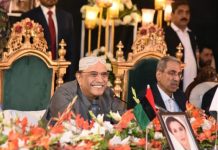Centreline Report/DNA
PESHAWAR, Experts have attributed the failure of the recent Pakistan-Afghanistan peace talks in Istanbul to the close nexus between the Afghan Taliban regime and the banned Tehrik-e-Taliban Pakistan (TTP).
Former Inspector General of Police and Home Secretary Khyber Pakhtunkhwa, Syed Akhtar Ali Shah, told APP on Wednesday that the strong nexus between the Afghan Taliban region and the TTP-backed Fitna-ul-Khawarij were the main reason behind the breakdown of the latest round of peace negotiations held in Turkiye’s Istanbul.
He said that under the Doha Peace Agreement, the Afghan Taliban had committed in writing that Afghan soil would not be used against any foreign country.
However, he claimed that the Taliban later retracted from their commitment and facilitated cross-border infiltration of Fitna-ul-Khawarij militants to carry out attacks inside Pakistan.
Akhtar Ali Shah reiterated that Pakistan had repeatedly engaged with the Afghan Taliban government over persistent cross-border terrorism orchestrated by Indian-backed terror groups such as Fitna-al-Khawarij and Fitna-al-Hindustan, but Kabul had failed to act against terrorist outfits operating from its soil.
He said that after days of border clashes and strikes on Gul Bahadur terror camps inside Afghanistan, Islamabad and Kabul had initiated dialogue in Doha Qatar, which resulted in a temporary ceasefire and an agreement to meet again in Istanbul to develop mechanisms for sustainable peace.
“Unfortunately, the second round of talks in Istanbul failed due to the Taliban–TTP nexus and non serious attitude of Afghan Taliban delegation,” he added.
The former IGP stressed that Pakistan’s serious and consistent diplomatic efforts for regional peace and stability had proved futile because of the Afghan Taliban’s continued support to anti-Pakistan terrorist groups.
He claimed that Afghan Talibans regime was using terrorism as weapon of obtaining foreign funding.
“Since the Taliban regime bears no responsibility towards the Afghan people and thrives on a terror economy, it seeks to drag the Afghan nation into unnecessary conflict,” he said, adding that Kabul’s refusal to provide written assurance against cross-border attacks effectively gave a “free licence” to terrorists and foreign terror proxies to target Khyber Pakhtunkhwa and Balochistan.
Former Ambassador Manzoorul Haq also condemned the Afghan Taliban’s “stubborn and non-serious” attitude during the Istanbul talks.
He said it was in Afghanistan’s own interest to adopt a rational approach and resume meaningful dialogue with Pakistan, as terrorism posed a grave threat to regional peace and stability.
“Pakistan has held countless rounds of talks with the Afghan Taliban regime, but they have always remained indifferent to our losses,” Manzoor said.
“After enduring massive losses of men and material over the past four years, Pakistan’s patience has reached its limit and was left with viable solution but to take strong action against terrorists and terror camps across the western border for protection of lives and properties of its people.”
He said Pakistan, at the request of brotherly nations Qatar and Turkiye, engaged with the Afghan Taliban interim Govt on a single-point agenda to ensure Afghan soil was not used by terrorist groups as a training and logistics base for attacks in Pakistan.
He thanked Qatar and Turkiye for facilitating the dialogue and their efforts to persuade Kabul to stop using terror proxies as leverage against Islamabad.
However, he lamented that the Afghan side repeatedly deviated from the core issue of fighting terrorism.
“During the four-day dialogue, the Afghan Taliban delegation initially agreed to Pakistan’s legitimate demand for decisive action against terrorist organisations, and sufficient evidence was shared with Afghan negotiators,” he said.
“Yet, despite acknowledgment by the Taliban and the brotherly host countries, the Afghan side gave no assurance to halt infiltration by the banned TTP and other terror groups.”
Manzoor said the Afghan delegation’s repeated backtracking and blame-shifting rendered the dialogue fruitless. “Instead of accepting responsibility, they resorted to excuses and deflection during Istanbul talks,” he added.
The experts emphasised that ensuring the safety of its citizens remains Pakistan’s top priority, and Islamabad will continue to take all necessary measures to safeguard its people from terrorism.
They urged the Afghan Taliban to immediately dismantle all terror camps and sanctuary operating within Afghanistan.
Professor Dr. A.H. Hilali, former Chairman of the Political Science Department at the University of Peshawar, also condemned the Afghan Taliban’s irresponsible approach.
He revealed that an agreement was close to being finalised in Istanbul, but Afghan negotiators backpedalled multiple times after receiving instructions from Kabul.
He said the talks collapsed as Afghan representatives reversed their stance four to five times during the negotiations on behest of their foreign terror sponsors.
The experts further accused the Modi-led Indian government of exploiting Afghanistan to destabilise Pakistan.
They alleged that New Delhi was using Afghan soil to avenge its setbacks on the eastern front and to divert international attention from grave human rights violations and state terrorism in Indian Illegally Occupied Jammu and Kashmir (IIOJK).
They reiterated that Pakistan will not tolerate cross-border terrorism any more and urged the international community to hold the Afghan Taliban accountable for violating their commitments under the Doha Agreement.

















